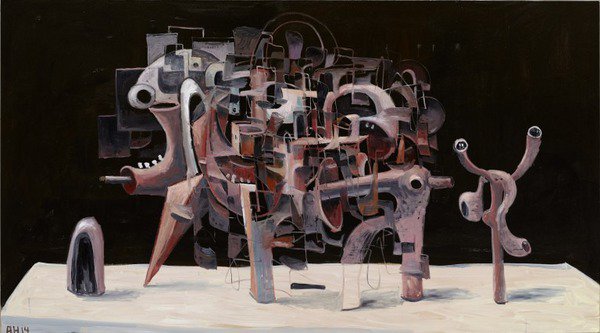Anton Henning
dal 7/11/2014 al 16/1/2015
Segnalato da
7/11/2014
Anton Henning
Galerie Bob van Orsouw, Zurich
Henning, in his pictures, creates liveable spaces. Intertwining lines coalesce into surreal creatures, merge with sculptural portraits and nude drawings, that fade into decorative contours.

Just as we need an opposite in order to develop a consciousness of our own self,
borders are best tested by something or someone rubbing against them,
as in an itch that gives us a consciousness of the skin we are wrapped in.
Carlo McCormick
Anton Henning, in his pictures, creates liveable spaces. Intertwining lines coalesce into
surreal creatures, merge with sculptural portraits and nude drawings, that fade into decorative
contours. Canvases, wall paints, light or furniture, the Henning universe knows no boundaries
and casts an immediate spell of creative frictions and irritations over the observer.
Magritte‘s dainty clouds, Picasso‘s cubistic forms or Duchamp›s machines are insolubly entwin-
ed in Henning‘s world of images. However, the artist quotes his predecessors not merely in the
spirit of nostalgic repetition of things seen before. Rather, they are taken apart bit by bit,
quite blatantly mixed up and reassembled in a very Henningian way, not without irony. Coming
up against each other, they reveal new contexts, a similarity, a difference, or a surprising
realisation. With his work titles Henning too creates amusing confusion. On the canvas, funnels
and pipes twist and turn. They remind us rather of a physical test assembly than of a portrait,
as the artist calls one of the works. Yet thanks to this classic genre label the lines and
holes suddenly turn into gaping mouths, with bared teeth, and staring eyes. Through the
categorisation, the abstract line becomes animated form. But every recognised vitality, before
the next still life, appears to dissolve in its petrified fragmentation. For doesn‘t it show
very similar structures as the portrait?
How do I see and comprehend (see and comprehend art)? Not only our dealing with art and history
is reflected on here, but seeing itself becomes the subject. The question comes to a head here
that Henning has always been confronting us with: where is the difference between life and art,
between reality and representation? Behind every corner, in Henning‘s oeuvre, we come across
new stumbling blocks, inviting us to pause and think for ourselves. Ideally, we may assume,
the artist would like those questions to be followed by a heated debate that once more fills the
clinical halls of the white cube with the energy pervading his pictures.
The Bob van Orsouw Gallery is pleased to present already the fifth solo exhibition of artist
Anton Henning, born in Berlin in 1964
His extensive oeuvre has been shown in numerous solo exhibitions, e.g. at Magasin 3,
Stockholm (2012); Mamco, Geneva (2012); Georg Kolbe Museum, Berlin (2009); Haus am Waldsee,
Berlin (2009); Kunsthalle Mannheim (2009); Gemeente Museum, The Hague (2008); S.M.A.K.
Stedelijk Museum voor Actuele Kunst, Ghent (2007); MARTa Herford, Herford (2005); Museum für
Moderne Kunst, Frankfurt (2005); and Kunstmuseum Luzern (2003).
Not to forget the artists participation in international group shows, e.g. Bad Thoughts,
Collection Martijn and Jeannette Sanders, Stedelijk Museum, Amsterdam (2014); Painting Fore-
ver! Keilrahmen, KW Institute for Contemporary Art, Berlin (2013); The collection. German art
from Kiefer to Henning, Museum Boijmans van Beuningen, Rotterdam (2012); If not in this period
of time – Contemporary German Painting, Museu de Arte de Sao Paulo, Sao Paulo (2010); Berlin
Transfer – Junge Kunst der Berlinischen Galerie und der GASAG, Berlinische Galerie, Berlin
(2010); and Interieur/Exterieur: Wohnen in der Kunst, Kunstmuseum Wolfsburg (2008).
Image: Grosses Stilleben No. 4, 2014, Oil on canvas 157 x 283 cm / 61 3/4 x 111 3/8
Opening 8th November
Galerie Bob van Orsouw
Limmatstrasse 270 Zurich, Switerland
Admission free



